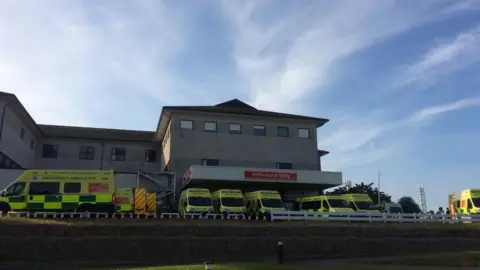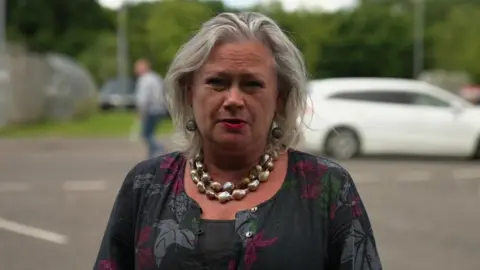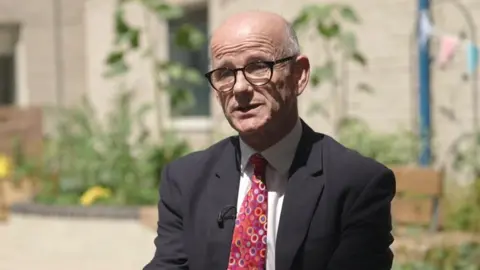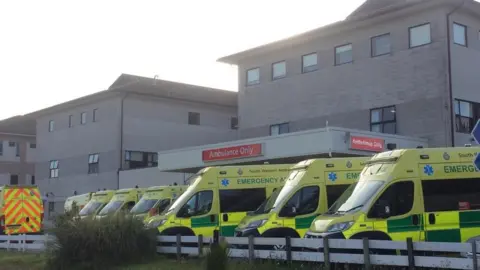How healthy is the NHS in the South West?
 BBC
BBCSince free universal healthcare was first introduced 75 years ago, the health of the nation and region has hugely improved. But following what the NHS described as the most challenging winter on record - some aspects of care have failed to return to pre-pandemic levels. So how healthy is the NHS in the South West?
"I'm proud of the NHS, I'm sure they're doing their best, but it is difficult for them at the moment."
In a few words one man in Plymouth summarises exactly what's happening as the NHS turns 75.
At the last count, in the BBC Spotlight region there were nearly 1,400 people waiting more than 12 hours at A&E - Derriford and the Royal Cornwall Hospital have some of the largest numbers of people waiting in the country.

The South West also has the second slowest ambulance response times for emergency conditions in England.
And there are currently nearly 700,000 patients on NHS waiting lists for the greater South West - a record figure.
There is no doubt the NHS in all regions in England is facing challenges, but the unique demographics of the South West is making the problems here particularly difficult.
Let us take Cornwall as an example. The county has only one acute hospital for a large peninsula.
It also has an older average population and therefore huge pressures on social care.
Many parts of Cornwall are unaffordable due to their popularity with second homeowners, meaning low wage jobs like those in social care are not attractive.
But without extensive social care provision, the Royal Cornwall Hospitals NHS Trust consistently appeared as the worst offender for long waits for ambulances last winter.

As medics repeatedly told me "if you can't get people out of the back of the hospital, you can't get them through the front doors".
The result has been tragic and led to shocking stories, like the case of Di Hudson whose husband died of a stroke after waiting more than 13 hours for an ambulance.
Kate Shields, the head of the NHS in Cornwall, said she believed the situation was improving.
"I'm really hopeful because we've got a range of services that we haven't had in previous winters," she said.
"So a Falls Service for example, that will run from eight in the morning to two in the morning - 80% of people who see the Falls Service don't go to hospital, so we can look after people where they live.
"And if you've got chest pain, you don't have to go to Treliske to find out if it's from digging the garden or from a cardiac event.
"So that and making sure we've got really good out of hospital care on the day, so we don't overload general practice - and equally we don't send people to Truro [hospital] who don't need to go."

Another challenge the South West faces is attracting NHS workers to the region.
You might think with its stunning scenery and quality of life, this would be easy. But the problems with housing costs are massively off-putting.
Dr Michael Marsh, the head of the NHS in the South West, said: "We absolutely need affordable accommodation for key workers - and that's an issue that society, local government and national government need to consider.
"But we also need to show to the staff working in the health service [in the South West] what a great job, what a great career and what an invaluable contribution you can make to society."
Officials hope this winter will be less challenging around emergency care thanks to new measures and better ways of working.
And it is a rare day when patients do not praise the staff who have treated them, regardless of the situation.
'Needs a lot of help'
There is also plenty to be positive about - with the South West's unique position enabling it to be a hotbed of medical innovation and experience.
So will it still be around for its next major birthday?
Saoirse Mallorie is a senior analyst with the Kings Fund - an independent charity that works to improve health and care in England.
She said: "It's not the model of the NHS that's wrong, it's the NHS's current performance.
"The model can work, but it needs a lot of help at the moment to make it work. And I think as well looking back at the NHS's 75 years there is cause for hope.
"If you look back at the first decade of this century and there was huge progress made on the likes of waiting lists. It can be done, and it has been done. I like to hope it can be done again. But it would be a mistake to think it will be either a quick fix or an easy fix."

Follow BBC News South West on Twitter, Facebook and Instagram. Send your story ideas to [email protected].
